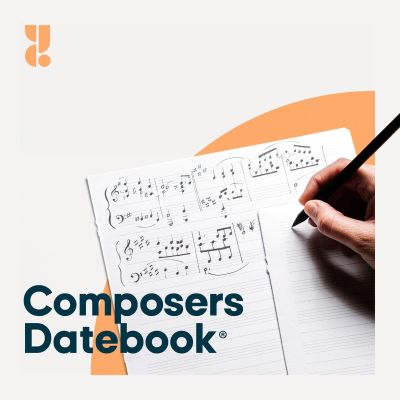Composers Datebook™ is a daily two-minute program designed to inform, engage, and entertain listeners with timely information about composers of the past and present. Each program notes significant or intriguing musical events involving composers of the past and present, with appropriate and accessible music related to each.
Gesamtlänge aller Episoden: 3 days 20 hours 54 minutes
A Fanfare for the Kennedy Center
On today’s date in 1971, the Concert Hall at the newly opened Kennedy Center in Washington, D.C., was inaugurated with a gala performance by the National Symphony Orchestra led by Antal Dorati, its Music Director back then. The National Symphony Orchestra, or NSO, was founded in 1931, and until the opening of the Kennedy Center, had used Constitution Hall as its home base...
Davis? Davies? Or Mavis?
Today's date in 1934 marked the birthday of the late British composer Sir Peter Maxwell Davies. Now, his name is spelled D-A-V-I-E-S, so most Americans tend to pronounce it “Day-VEES,” even though “Davis” is the common British pronunciation. Once, when Sir Peter was in the U.S., a British journalist called a Las Vegas hotel where the composer was staying and asked to speak to Peter Maxwell DAVIS. The receptionist said there was no one there by that name...
A 40-voice birthday greeting from Tallis?
On today’s date in 1573, Queen Elizabeth the First celebrated her 40th birthday. According to SOME musicologists, the music-loving monarch received as a birthday gift a Latin motet for 40 voices by Thomas Tallis titled “Spem in alium,” which translates as “Hope in All Things...
A "well-Krafted" concerto?
Consider, if you will, the poor timpanist. At most symphony concerts, they sit quietly—waiting for the moment when a dramatic exclamation point is required from the kettledrums. While the violinists rarely get a break, the timpanist must sit patiently for most of the evening, biding their time, waiting for the precise moments to strike. On rare occasions, however, the timpanist is the CENTER of attention as soloist in a timpani concerto...
Prokofiev's String Quartet No. 2
In 1941, as the German Army was overrunning Russia, the Soviet government evacuated important artists to remote places of safety. Composer Sergei Prokofiev, for example, found himself in the little town of Nalchik, nestled in the foothills of the northern Caucasus Mountains about 1000 miles away from the front. Prokofiev was intrigued by the region’s folk music, and, taking a break from a big project to turn Tolstoy’s novel War and Peace into an opera, composed his String Quartet No...
Tchaikovsky and Glass at the movies
For ballet lovers, the opening of Tchaikovsky’s ballet “Swan Lake” conjures up tutus, but for old-time movie buffs, this same music triggers memories of many black-and-white films of the 1930s. Back then, the eerie opening measures of “Swan Lake” served as the “main title” music for dozens of old Universal Studios thrillers, including the famous 1931 film of Bram Stoker’s novel, “Dracula,” starring Bela Lugosi...
Beethoven's "Razumovsky" Quartets
On today’s date in 1806, Ludwig van Beethoven offered his publisher Breitkopf and Härtel three new string quartets—works we know today as the three “Razumovsky” Quartets, that were eventually issued as Beethoven’s Opus 59. In Beethoven’s day, Vienna was swarming with Russian, Polish, and Hungarian aristocrats with a taste for music. Among them was Count Andreas Kyrilovich Razumovsky, the Russian ambassador to Vienna...
E. J. Moeran
On today’s date in 1948, at a Proms concert at the Royal Albert Hall, the London Symphony gave the premiere performance of the “Serenade in G Major” by the British composer Ernest John Moeran. Moeran was born in 1894 in London, but Ireland became his adopted home and musical inspiration during the last decades of his life. Moeran was fascinated by folksongs, and his method of collecting them was to sit in a country pub and wait until an old man started singing...
Mozart "dissed" by Dittersdorf?
On today’s date in 1785, Wolfgang Amadeus Mozart dedicated six of his string quartets to his friend and older colleague, Joseph Haydn. Earlier that year, Haydn heard some of them performed in Vienna. Leopold Mozart, Wolfgang’s father, was also present, and must have been elated when Haydn said, “Before God and as an honest man I tell you that your son is the greatest composer known to me either in person or by name...
Joan Tower's Angels
Angel Fire is a village in the New Mexico Rockies that hosts an annual chamber music festival. To celebrate their 25th anniversary, Music from Angel Fire commissioned the American composer Joan Tower to write them a new work, which she titled “Angels”–a virtuosic String Quartet, her fourth, which received its premiere performance by the Miami String Quartet on today’s date in 2008...
